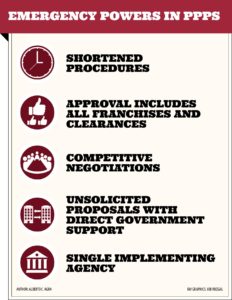‘Responsive-ility’ and responsibility Public-Private Partnership (PPP) arrangements—whether for water, reclamation, power, mass transport systems and…
Emergency powers and PPPs. Do they mix?
Emergency Powers and PPPs. Do they mix?
 WHO will public-private partnerships (PPPs) fit into the proposed grant of emergency powers in addressing the traffic crisis? What are the boundaries of the grant of emergency powers to the Executive branch of government? What PPP related laws must be changed to expedite PPPs?
WHO will public-private partnerships (PPPs) fit into the proposed grant of emergency powers in addressing the traffic crisis? What are the boundaries of the grant of emergency powers to the Executive branch of government? What PPP related laws must be changed to expedite PPPs?
- Amendment of laws, not the Constitution. The inherent limitation to the power of Congress to enact laws is the same restraint for the legislative grant of emergency powers to the President. The 1987 Constitution cannot be amended or revised through ordinary legislation. The proposed grant of extraordinary powers to the Executive Branch must not be inconsistent with the basic law of the land. Thus, the Supreme Court could not be deprived of its judicial power, the right to due process cannot be abrogated and the local autonomy enjoyed by local government units cannot be revoked.
- Enhancement, not abolition of private-sector participation. Another constitutional policy, which must be respected even under a “state of traffic emergency or crisis,” is the recognition of the “indispensable role of the private sector.” Whether as partner, concessionaire, contractor, supplier, funder, designer or operator, the private sector can, and should, participate in addressing the
traffic crisis.
The framers of the Constitution foresaw, which I believe is true to this very day, that government cannot address the woes of the country and move toward better quality of life without the private sector. We are all stakeholders.
- Traffic is not, not is, an indicator of progress. Some have argued that traffic is a measurement of progress because more people can afford to buy cars. I beg to disagree. Mass transit that is appealable to and will be used by all sectors of society is. But this takes unwavering political will, strong sense of urgency, collective undertaking and patience, broad participation from all stakeholders and purposive PPPs. The emergency powers must be
anchored on these. - Prioritization of projects and amendments of PPP laws. The people can no longer wait. I cannot wait. Emergency powers are needed soon, even yesterday. Within the next two years, construction of mass-transit systems must begin. This means that awards for procurement contracts and PPP projects must be made not later than 2017.
In 2014 a final report titled Roadmap for Transport Infrastructure has already been submitted to the National Economic and Development Authority (Neda). Numerous studies have been prepared. It is now time for action. Selection procedures under the Government Procurement Reform Act, Build-Operate-and-Transfer Law and Joint Venture Neda Guidelines must be shortened.
Unsolicited proposals must be allowed for priority projects, even if there is a direct government guarantee, subsidy or equity. For some projects, prefeasibility studies
may be sufficient.
An alternative procedure may be introduced for PPPs—competitive negotiations. The implementing agency may, after publication, conduct simultaneous negotiations with eligible and qualified proponents and awards the project to the proponent that offers the best combination of quality and price. A second round of negotiations may be conducted to elicit better terms.
Approvals must be streamlined and redundancies eliminated. Consent of the Neda-Investment Coordination Committee should be enough, regardless of the amount, even for purposes of granting any franchise and environmental compliance certificates. Another suggestion is that one agency, maybe the Department of Transportation, could be designated as the sole implementing agency.
Enough said. Let us move.
